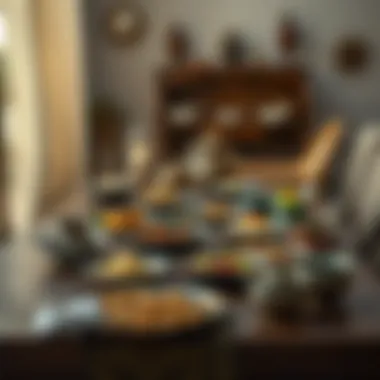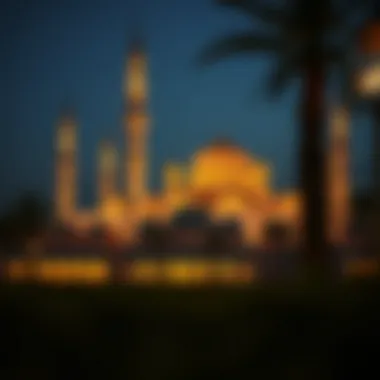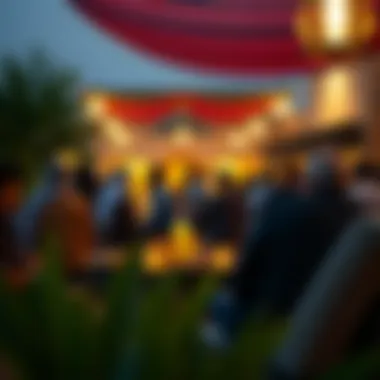Understanding Iftar Timing in the UAE: A Cultural Insight


Intro
During the holy month of Ramadan, iftar holds a special place in the hearts of many in the United Arab Emirates. This meal, breaking the fast after a day of abstinence from dawn until sunset, is not merely about nourishment. It symbolizes community bonds, shared traditions, and cultural significance deeply rooted in Islamic practices.
In the UAE, iftar time varies across different regions, influenced by the geographical latitude, local customs, and the precise timing of sunset. Each city—from Abu Dhabi to Dubai, Sharjah, and Ajman—offers its own flavor of this meal. Tuning into the proper iftar time is critical for Muslims observing Ramadan, as this marks the moment they can finally enjoy a meal, often accompanied by family and friends. As the sun sets, a sense of anticipation fills the air; the call to prayer resonates, signaling the end of a day's fast.
This piece aims to delve into the meaning of iftar along with its cultural, social, and logistical dimensions, providing insights into how it fits within the broader context of daily life during Ramadan.
Here, we will uncover:
- The significance of iftar beyond just a meal.
- How the timing of iftar is calculated and varies across regions.
- The culinary traditions associated with iftar.
- The impact of iftar on individual daily routines and social interactions.
The importance of understanding iftar timing extends beyond just the practice of breaking fast; it reflects the cultural richness and the social bonds that Ramadan fosters among individuals and communities. Join us as we embark on this comprehensive exploration of iftar in the UAE.
The Concept of Iftar
Iftar, the meal that breaks the fast during the holy month of Ramadan, holds a profound significance within Islamic culture, particularly in the UAE. It’s more than just a moment to indulge in food after a long day of abstaining; it embodies a rich blend of spiritual reflection, community bonding, and cultural heritage. The very essence of iftar highlights the importance of gratitude, humility, and social responsibility among individuals and families, setting the stage for numerous customs and practices that vary across different regions and families.
Definition and Importance
Iftar can be defined simply as the evening meal consumed after sunset to mark the end of the daily fast. Yet, at its core, it represents a powerful ritual that nurtures not just the body but the soul. During Ramadan, fasting is seen as a means of purification, self-discipline, and an opportunity for Muslims to reflect on their faith.
The significance of iftar goes beyond satisfying hunger. Here are some key aspects:
- Community and Togetherness: Iftar provides a platform for individuals and families to come together. In many households, this meal is a time to strengthen familial bonds, encouraging the gathering of loved ones.
- Cultural Celebrations: Various traditional dishes and beverages are often served during iftar, showcasing the rich culinary heritage of the UAE. Sharing a meal is a way to celebrate local customs and foster pride in one’s culture.
- Charitable Mindset: With a focus on community, many affluent families partake in charitable acts during this time. Providing iftar meals for the needy becomes a common practice, promoting the core Islamic values of generosity and compassion.
- Spiritual Reflection: Iftar isn’t solely about eating; it’s a moment to express gratitude for the blessings in life. Many people take this time for prayer and contemplation, aligning it with their spiritual beliefs.
In the UAE, iftar is also woven into the social calendar as a cherished tradition that helps the diverse population of the country connect through shared experiences, regardless of their background. The meal serves as a reminder of the societal values that unite individuals in common purpose.
Historical Context
The tradition of iftar dates back to the time of the Prophet Muhammad. Historical texts reveal that he would break his fast with dates and water, setting an example that continues to be followed by millions today. Over time, iftar evolved into a communal event marked by varied practices influenced by local cultures and histories.
In the UAE, especially with its cosmopolitan society, iftar has adopted many flavors and traditions from different cultures—emphasizing the country’s dedication to inclusivity. Those new to the region may find iftar to be both refreshing and educational, as they witness the unique blend of traditional Emirati dishes alongside international cuisines.
Today, iftar remains a central aspect of Ramadan in the UAE. From lavish buffets in hotels to simple family meals at home, the essence of the meal reflects a blend of historical reverence and modern context, paying homage to deep-rooted customs while embracing contemporary lifestyles.
Iftar Timing in the UAE
Iftar, as the daily breaking of fast during Ramadan, holds a paramount importance for Muslims in the UAE. Understanding its timing involves not just a simple calculation, but also a deep appreciation of cultural customs and religious principles. The timing of Iftar provides a structure to the day, allowing individuals and families alike to engage in this sacred practice with a sense of community and purpose. It harmonizes daily activities, shaping both routine and devotion as the sun sets across the desert landscape.
Calculation Methods
Determining the specific time for Iftar requires knowledge of the Islamic calendar, particularly the position of the sun. Traditionally, the call to prayer, or Adhan, signifies the moment to break the fast. This timing is marked by the sunset, which varies depending on geographical factors and local climate.
Many UAE residents rely on Islamic centers or local mosques for accurate timings as they take into account precise longitude and latitude. Moreover, various mobile applications have become indispensable tools, providing alerts for Iftar time based on one’s location. This tech-savvy approach considers the minute variations in timings related to different areas in the UAE. Through such modern solutions, one can ensure that they break their fast at the exact moment permissible according to Islamic law.
- Local mosques often publish the Iftar timings for the month of Ramadan.
- Smartphone apps such as IslamicFinder or Muslim Pro help simplify access to these details.
Variations by Region
The UAE is a melting pot of cultures, and the differences in Iftar timing across the regions reflect this diversity. The geographical spread—from the bustling streets of Dubai to the serene suburbs of Fujairah—can lead to marked differences in sunset times. For instance, those in the Northern Emirates may experience Iftar a few minutes earlier than those closer to the equator or in coastal cities.
In urban environments, high-rise buildings may cast long shadows, creating a unique scenario where the sun may appear to set later than it actually does. As such, timing is adjusted accordingly to assure that individuals are adhering to the correct Islamic observances. Local customs may also influence the time for breaking fast; in some families, the tradition is to wait a brief period after the Adhan to gather the family together, reflecting the community spirit and the value of sharing this moment with loved ones.


Cultural Significance of Iftar
Iftar, the meal that breaks the daily fast during Ramadan, serves a far greater purpose than merely providing sustenance at sunset. Within the UAE's cultural landscape, iftar acts as a powerful conduit for community ties and familial bonds. It is a time of reflection, gratitude, and unity. Even in urban bustling settings like Dubai and Abu Dhabi, this practice brings diverse residents together amidst their fast-paced lives. It highlights the importance of communal activities, where everyone participates, reflecting the essence of sharing and caring.
Community and Family Gatherings
Iftar not only nourishes the body but also feeds the spirit of connectedness. Families across the UAE prepare for this significant meal with anticipation, often inviting extended relatives and friends to join. It’s common to see tables adorned with abundant arrays of traditional dishes, signaling that the fast is over. This communal gathering reinforces family ties, enabling members to share stories and experiences.
- The iftar table often includes staples such as dates, fresh juices, and traditional dishes like Harees and Lamb Kabsa.
- Many families make it a point to gather every evening during Ramadan, ensuring that while life goes on, the bonds of family are reinforced.
For expatriates in the UAE, these gatherings transcend cultural lines, as various communities come together to celebrate their unique traditions. It’s a melting pot of flavors and customs that enriches everyone's experience. People from all backgrounds join in, creating a rich tapestry of human experiences.
Charitable Activities
Another vital aspect of iftar is its charitable significance. The spirit of giving is deeply ingrained in the holy month, and many choose to extend their blessings beyond their homes.
- Community outreach programs often organize large iftar events for those less fortunate, ensuring no one eats alone.
- Donations of food and resources are commonplace, with local businesses and individuals often contributing to provide meals for those in need.
"An iftar meal is not just about fulfilling one's hunger but about opening one's heart and hands to those around them."
Various charities and organizations use this time to engage the community in charitable acts, whether through providing meals or organizing special events. Many expatriates find it rewarding to take part in these charitable initiatives, fostering a sense of belonging while aligning with the values celebrated during Ramadan.
In summary, the cultural significance of iftar in the UAE extends far beyond eating together after a day of fasting. It embodies community strength, familial love, and an enduring commitment to helping others, transcending social and cultural divides.
Culinary Traditions of Iftar
The act of breaking the fast during Ramadan, known as iftar, extends far beyond mere sustenance; it's a cornerstone of cultural heritage in the UAE. Here, culinary traditions during iftar play an essential role in promoting not only nourishment but also social cohesion and community bonding. The diversity of dishes served both reflects the influences of various cultures residing in the UAE and caters to the varied palates of its community, thus becoming a culinary tapestry that connects people.
Key aspects to consider about culinary traditions in iftar include:
- Regional Variations: The types of dishes can differ vastly based on local customs and available ingredients.
- Culinary Innovation: While traditional dishes are cherished, modern chefs are often experimenting, blending old recipes with contemporary flavors.
- Community Celebration: Food during iftar is often shared, emphasizing the communal aspect of the experience, which strengthens social ties.
Common Dishes and Beverages
During iftar, the tables across the UAE are adorned with a rich selection of dishes. Common staples include:
- Dates: Traditionally, the fast is broken with dates and water, in line with the Sunnah of the Prophet Muhammad. This serves a dual purpose: a refreshing energy boost and a sweet treat mired in historical significance.
- Harees: A wheat and meat dish that's both hearty and comforting, often served during the holy month.
- Samboosa: These savory pastries are a favorite, filled with various ingredients, including meat, vegetables, or cheese, often spiced to perfection.
- Luqaimat: These sweet dumplings, crispy on the outside and soft inside, drizzled with date syrup, are a must-have dessert.
- Arabic Coffee: Known as qahwa, this beverage is typically flavored with cardamom and served in small cups, symbolizing hospitality.
In many households, the preparation of these dishes becomes a family event, with everyone pitching in to create a sumptuous feast. Beyond individual preferences, the act of sharing these meals promotes a sense of unity within communities.
Innovative Gastronomic Trends
In recent years, iftar culinary traditions have seen an evolution towards innovation as chefs and home cooks alike embrace new techniques and ideas while still honoring traditional flavors. This has led to fascinating gastronomic trends, such as:
- Fusion Cuisine: Many establishments are now offering fusion iftar menus, where traditional Emirati dishes are blended with international flavors. For instance, you might find harees with a contemporary twist, or samboosa filled with unexpected ingredients like truffle or cheese.
- Health-Conscious Options: As more individuals become aware of dietary restrictions, restaurants and caterers are now offering gluten-free, vegan, and low-calorie iftar options without sacrificing taste.
- Themed Iftar Dinners: Popular venues may host themed iftar events that celebrate different culinary traditions from around the world, encouraging guests to explore global flavors while maintaining a sense of Ramadan.
The confluence of these innovations with traditional practices offers something for everyone, allowing individuals and families to engage in a culinary journey that reflects both their heritage and modern trends. Each iftar meal thus serves as a reminder of shared values, cultural identity, and the importance of togetherness during this holy month.
Modern Celebrations of Iftar
In the rapidly changing landscape of the UAE, modern celebrations of iftar have evolved significantly, intertwining tradition with contemporary practices. This dynamic adaptation captures the essence of iftar while fostering a sense of unity and community, attracting both locals and expatriates alike. Understanding these modern celebrations sheds light on how they serve as a backdrop for cultural exchange and social interaction during the holy month of Ramadan.
Iftar at Restaurants and Hotels
Dining out for iftar has become a prominent trend among various segments of the population. High-end restaurants and luxurious hotels often present lavish iftar buffets, showcasing a melting pot of culinary influences. These establishments, such as the Burj Al Arab or the Emirates Towers Hotel, offer extensive menus featuring traditional UAE dishes alongside international flavors. Menus often include specialties like lamb ouzi, chicken majboos, and an array of dates and desserts, catering to diverse palates.


Dining out not only allows for delightful culinary exploration but also provides a space for social gatherings. Families and friends can share experiences and build memories, breaking their fast together in a festive atmosphere. It’s not merely about sustenance; the environment plays a crucial role in enhancing the iftar experience. Restaurants often play soft background music, and some even provide entertainment or themed nights designed to engage diners.
However, with increasing popularity, comes the challenge of reservations and crowded venues. It's advisable for those wishing to experience these vibrant settings to book tables well in advance, as high demand can lead to disappointment. The communal aspect of shared dining spaces also emphasizes the spirit of togetherness, reflecting community values deeply rooted in Emirati culture.
Private vs. Public Iftar Gatherings
The distinction between private and public iftar gatherings reveals significant insights into social customs within the UAE. Private iftars typically occur within homes where families host gatherings for relatives and close friends. Such intimate settings allow for personal connections and deep narratives, which can be heartwarming and enriching. Traditional dishes prepared at home often carry a unique personal touch, making the experience even more authentic. Guests often bring small gifts, like desserts or fruits, signaling a gesture of appreciation for the host.
Conversely, public iftar gatherings are often associated with larger community events organized by mosques, community centers, or local organizations. These can range from informal get-togethers in public parks to organized events featuring cultural performances. They facilitate an inclusive atmosphere where diverse groups can come together, sharing meals and stories, regardless of their background.
Such public gatherings highlight the inclusivity and diversity characterizing Emirati society, attracting individuals from a variety of cultural heritages. This serves to fortify community ties while celebrating the rich tapestry of traditions from across the globe.
In summary, whether dining out at a luxury restaurant or participating in a communal event, the modern celebrations of iftar in the UAE reflect greater values of social cohesion and cultural exchange. The act of breaking bread together not only fulfills a need for sustenance but also nurtures connections among individuals, enriching the fabric of society.
Iftar: A Reflection of Societal Values
Iftar, the meal that breaks the fast during the holy month of Ramadan, is far more than just a daily ritual for Muslims; it's a powerful reflection of broader societal values in the UAE. This tradition embodies aspects such as inclusivity, community bonding, and cultural diversity. Understanding these elements is key to appreciating how Iftar weaves into the social fabric of modern Emirati life.
Inclusivity and Diversity
Inclusivity is a hallmark of Iftar, showcasing how the tradition transcends mere religious obligations. The UAE is home to a diverse population, with expatriates from various cultures and backgrounds. During Ramadan, whether you're a local Emirati or a newcomer from abroad, the spirit of Iftar welcomes all. It’s common to see iftar gatherings that include friends and neighbors from different nationalities, who join around the same table, sharing food, laughter, and stories. This practice reflects a shared human experience, reinforcing the idea that community is built on mutual respect and understanding.
Moreover, many organizations host open Iftar events in public spaces, inviting anyone interested to join. Such efforts promote interfaith dialogue and community unity. The act of breaking bread together fosters relationships and aligns with the values of compassion and hospitality that are prominent in Emirati culture.
"Food has an extraordinary power to bring people together, transcending borders and cultures."
Fostering Cross-Cultural Connections
Iftar acts as a bridge for cultural exchange, compelling individuals to engage with one another beyond their differences. Guided by the teachings of Ramadan, many UAE citizens extend invitations for iftar to coworkers, friends, and even strangers. Food becomes a medium through which stories and traditions are shared, creating connections among cultures.
In restaurants, chefs often experiment, creating unique dishes that incorporate various culinary styles while remaining respectful of traditional practices. The iftar menus frequently feature a blend of local Emirati food with Asian, African, and Western influences, symbolizing the melting pot that is the UAE. This gastronomic creativity not only highlights diversity but also fosters a sense of belonging for all participants during this sacred month.
Challenges During Iftar in Urban Settings
Iftar in a bustling setting like the UAE poses unique challenges that can affect the overall experience of breaking fast. It's not just about hunger or the timing of the sunset. The fast-paced urban lifestyle comes with its own set of hurdles that must be navigated adeptly. Understanding these challenges not only prepares one for the evening meal but also enriches the communal and social essence of iftar.
Traffic and Congestion Issues
When the clock nears iftar, the city transforms into a hive of activity. Streets that are typically busy get even more congested as families and friends rush home to break their fast. Traffic jams become the order of the hour, resulting in frustration for those trying to make it in time.
- Time Constraints: Many individuals are juggling work and family commitments, making it essential to replicate an efficient daily schedule. As fajr ends, the pressure mounts to get home quickly.
- Local Hotspots: Restaurants and mosques, where people flock for communal meals, are hotspots for heavy traffic, further delaying arrival times.
- Alternative Routes: Familiarity with less congested routes can be beneficial, yet these alternatives are often not well-known, causing delays.
The difficulty in managing time during this period can lead to unsettling experiences, detracting from the very spirit of iftar.
Logistical Considerations for Families
Beyond traffic, there are various logistical factors that families must consider when planning iftar in urban areas. Having an organized plan can significantly lessen the load of these challenges.
- Meal Prep: The time for preparing meals can be scarce. Families often need to balance between cooking at home or dining out, weighing both convenience and cost-effectiveness.
- Guest Management: If hosting relatives or friends, the logistics of seating, food preparation, and even rental of extra dining gear can become daunting. Everyone wants to enjoy the blessed month together, but sometimes it can feel like herding cats.
- Accessibility to food options: Urban areas are spoiled for choice, but at peak iftar times, quality and freshness can be compromised. Long queues and sold-out dishes can be a reality.
The Role of Technology in Iftar
In today's rapidly evolving landscape, technology plays a pivotal role in shaping various cultural practices, and the observance of iftar is no exception. In the UAE, where modernity seamlessly intertwines with tradition, technology enhances the iftar experience on multiple fronts. From the accurate calculation of iftar timings to the sharing of experiences, technology helps both residents and visitors navigate this cherished tradition with ease and precision.


Mobile Apps for Timing and Recipes
The holy month of Ramadan can be a whirlwind of activities and spiritual reflection. To help manage this period more efficiently, mobile applications have become essential tools for many. These apps not only provide precise timings for iftar across different emirates but also cater to the dietary needs and preferences of users. Popular apps like 'Ramadan 2023' and 'Muslim Pro' allow users to input their location, thereby generating accurate times for adhan (the call to prayer) and iftar.
Furthermore, these applications often include a plethora of recipes tailored for iftar, encouraging culinary exploration. Users can browse through traditional dishes like harees or sambusas, or even opt for modern fusion recipes that reflect the evolving dining scene in the UAE. The integration of video recipes and step-by-step guides ensures that even novices can whip up a delightful dish in no time.
- Quick access to local iftar timings based on location
- Vast collection of recipes that cater to diverse tastes
- User-friendly interfaces that guide cooking effortlessly
"In the era of smartphones, the simplicity of tracking iftar timings or discovering new recipes is just a tap away, making Ramadan a delightful culinary journey for many."
Social Media and Sharing Experiences
As we dive deeper into the intersection of technology and iftar culture, social media presents another layer of engagement. Platforms like Instagram and Facebook have transformed how individuals share their iftar experiences, ranging from home gatherings to extravagant dinners at luxurious venues. Many people take to these platforms to showcase their faithfully prepared iftar spreads, incorporating hashtags like #IftarTime and #RamadanEats.
These posts do more than just display festive meals; they foster a sense of community among users. People from varied backgrounds connect through shared experiences and recipes, breaking bread—even if virtually—across great distances. Couples, families, and friends often create events and group discussions around iftar, promoting inclusivity and sharing.
- Culinary showcase: Users can get inspired by others' unique takes on traditional dishes.
- Community building: Social media brings together individuals through shared practices and questions, enhancing the experience.
- Event promotion: Local restaurants and eateries utilize social media to advertise iftar specials and gatherings, enhancing awareness for patrons.
In sum, technology's role during iftar in the UAE is an embodiment of the blend between age-old traditions and modern conveniences. As the world becomes more interconnected, the way we share, cook, and connect during this important cultural moment reflects broader changes in society and community engagement.
Iftar as a Tourist Experience
Iftar in the UAE offers a unique glimpse into the country's rich culture and traditions, making it an important experience for tourists visiting during Ramadan. This period is not only significant for the locals but also provides a distinctive opportunity for visitors to engage with various facets of Emirati life. Understanding Iftar as a tourist experience entails recognizing its religious, cultural, and social implications, and how these can enrich the overall visit to the UAE.
Attractions for Visitors
During Ramadan, the UAE transforms into a vibrant tapestry of sights and sounds that captivate anyone willing to immerse themselves in the local customs. Some attractions include:
- Cultural Festivals: Many cities host festivals showcasing traditional music, art, and cuisine during Iftar. These events give tourists a chance to participate in local celebrations.
- Iftar Tent Events: Large, lavishly decorated tents serve as communal dining spaces where both locals and tourists can break their fast together, fostering a spirit of togetherness.
- Architectural Landmarks: Places like the Sheikh Zayed Grand Mosque in Abu Dhabi offer special evening tours during Ramadan, allowing visitors to appreciate breathtaking architecture while understanding the spiritual significance of the month.
- Bazaars and Souks: Exploring local markets during Ramadan leads to discovering unique Ramadan specialities, from traditional sweets to handmade crafts, making for perfect souvenirs.
When tourists venture into these experiences, they encounter not only culinary delights but also live the essence of togetherness celebrated during this holy month.
Iftar rekindles humanity's collective spirit, helping visitors understand Emirati values profoundly through shared meals.
Guided Iftar Tours
Guided Iftar tours present a remarkable way for tourists to engage with the intricacies of Ramadan. These tours are meticulously organized to blend cultural learning with culinary enjoyment. The benefits of joining such tours are manifold:
- In-Depth Context: Tour guides typically share insights on the significance of Ramadan, and Iftar in particular, enriching the meal with stories and anecdotes.
- Culinary Exploration: Participants often sample a variety of traditional dishes, allowing them to experience the local cuisine in its authentic form, less commonly found at typical tourist spots.
- Social Connections: Guided tours often feature small groups, facilitating conversation among participants that leads to lifelong friendships.
- Experiential Learning: Some tours also include visits to local families or community centers to see how Iftar meals are prepared and shared, offering a true taste of hospitality.
In essense, participating in guided Iftar tours allows tourists to experience the flavors of Middle Eastern cuisine while making meaningful connections with people, traditions, and local customs that are integral to the identity of the UAE during this sacred month.
Finale
In the context of this article, the conclusion serves as a vital recap, signaling the significance of Iftar in the cultural and social fabric of the UAE. As Ramadan unfolds, the breaking of the fast becomes much more than just a meal; it transforms into a moment of collective unity and reverence across communities, bridging gaps and fostering connections. This is not merely about timing; it's about traditions that resonate deeply with both the local populace and expatriates alike.
The Western Perspective on Iftar
From a Western viewpoint, Iftar might seem like a ritual limited to a specific religion, but it encapsulates far broader themes of community, hospitality, and cultural exchange. While many in the West associate Ramadan with fasting and reflection, the shared experience of Iftar encourages an invitation to partake in the feast, regardless of one’s cultural background. This opens doors for educational dialogues around the values of respect, understanding, and diversity.
Many Western expatriates residing in the UAE find themselves participating in Iftar events, sometimes with little prior knowledge of its practices. These gatherings present a unique opportunity to witness firsthand the vibrant culinary traditions and heartwarming communal spirit that thrives during this period. It’s a window into the UAE's rich cultural landscape, which is increasingly becoming a mosaic of voices and experiences. While some might find the timings of Iftar challenging—especially when balancing work and daily life—many appreciate the beauty of coming together around a shared meal.
Future of Iftar Celebrations in the UAE
Looking ahead, the future of Iftar celebrations in the UAE is likely to evolve in several intriguing ways, merging traditional elements with contemporary styles. Urbanization and technological shifts are changing how people approach their evening meals. For instance, restaurants are increasingly adopting innovative dining concepts that cater to diverse tastes. They are not simply offering traditional dishes but are also incorporating fusion cuisine that reflects the multicultural society of the UAE.
Furthermore, the role of technology is becoming more pronounced. Mobile apps dedicated to Iftar timing, recipes, and event planning are cropping up, aiding families in organizing meals seamlessly. Social media platforms are also serving as spaces where people share their Iftar experiences, fostering a digital community that transcends geographical boundaries. This dual evolution—maintaining traditions while embracing modernity—will likely shape how Iftar is celebrated in the coming years, ensuring it remains an inclusive affair that continues to strengthen community ties.
As society progresses, the essence of Iftar will endure, adapting to the nuances of modern life while retaining the core values that define its importance across generations.
Through this comprehensive exploration, it is clear that Iftar stands not just as a temporary observance, but as a lasting legacy that symbolizes resilience, unity, and adaptability.











